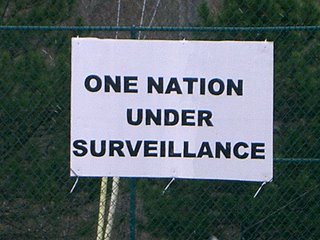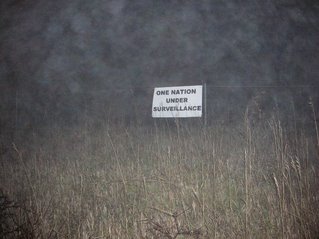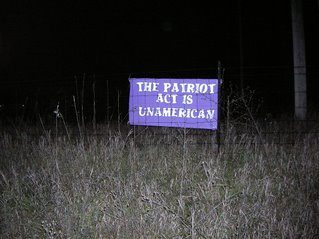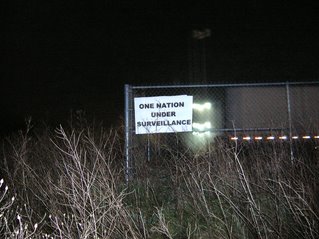





What if it emerged that the President of the United States was flagrantly violating the Constitution and a law passed by the Congress to protect Americans against abuses by a super-secret spy agency? What if, instead of apologizing, he said, in essence, "I have the power to do that, because I say I can." That frightening scenario is exactly what we are now witnessing in the case of the warrantless NSA spying ordered by President Bush that was reported December 16, 2005 by the New York Times.
According to the Times, Bush signed a presidential order in 2002 allowing the National Security Agency to monitor without a warrant the international (and sometimes domestic) telephone calls and e-mail messages of hundreds or thousands of citizens and legal residents inside the United States. The program eventually came to include some purely internal controls - but no requirement that warrants be obtained from the Foreign Intelligence Surveillance Court as the 4th Amendment to the Constitution and the foreign intelligence surveillance laws require.
In other words, no independent review or judicial oversight.
That kind of surveillance is illegal. Period.
Clearly IllegalUnfortunately, although the law in this matter is crystal clear, many Americans, faced with President Bush's bold assertions of "inherent" authority for these actions, will not know what to believe. There are only 5 points they need to understand:
Point #1: Electronic surveillance by the Government is strictly limited by the Constitution and Federal Law
The law on surveillance begins with the Fourth Amendment to the Constitution, which states clearly that Americans' privacy may not be invaded without a warrant based on probable cause.
United States ConstitutionFourth AmendmentThe right of the people to be secure in their persons, houses, papers, and effects, against unreasonable searches and seizures, shall not be violated, and no warrants shall issue, but upon probable cause, supported by oath or affirmation, and particularly describing the place to be searched, and the persons or things to be seized. (emphasis added)
The US Supreme Court (US v. Katz 389 US 347) has made it clear that this core privacy protection does cover government eavesdropping. As a result, all electronic surveillance by the government in the United States is illegal, unless it falls under one of a small number of precise exceptions specifically carved out in the law.
United States Code Title 50, Chapter 36, Subchapter 1Section 1809. Criminal sanctions
(a) Prohibited activities A person is guilty of an offense if he intentionally-
(1) engages in electronic surveillance under color of law except as authorized by statute
In other words, the NSA can only spy where it is explicitly granted permission to do so by statute. Citizens concerned about surveillance do not have to answer the question, "what law restricts the NSA's spying?" Rather, the government is required to supply an answer to the question "what law permits the NSA to spy?"
Point #2: There are only three laws that permit the government to spyThere are only three laws that authorize any exceptions to the ban on electronic eavesdropping by the government. Congress has explicitly stated that these three laws are the exclusive means by which domestic electronic surveillance can be carried out (18 USC, Section 2511(2)(f)). They are:
Title III and ECPA. Title III and the Electronic Commnunications Privacy Act make up the statutes that govern criminal wiretaps in the United States.
FISA. The Foreign Intelligence Surveillance Act is the law that governs eavesdropping on agents of "foreign powers" within the United States, including suspected foreign terrorists.
Point #3: The Bush-NSA spying was not authorized by any of these lawsTitle III and ECPA govern domestic criminal wiretaps and are not relevant to the NSA's spying. FISA is the law under which the NSA should have operated. It authorizes the government to conduct surveillance in certain situations without meeting all of the requirements of the Fourth Amendment that apply under criminal law, but requires that an independent Foreign Intelligence Surveillance Court oversee that surveillance to make sure that Americans who have no ties to foreign terrorist organizations or other "foreign powers" are not spied upon.
FISA was significantly loosened by the Patriot Act (which, for example, allowed it to be used for some criminal investigations), and parts of it now stand in clear violation of the Constitution's Fourth Amendment in the view of the ACLU and many others. However, even the post-Patriot Act version of FISA does not authorize the president to conduct warrantless eavesdropping on U.S. citizens or permanent legal residents in the U.S. without an order from the FISA Court. Yet it is that very court order requirement - imposed to protect innocent Americans - that the President has ignored.
In fact, one member of the FISA Court, Judge James Roberston, has apparently resigned from the court in protest of President Bush's secret authorization of this program. And the New York Times reported that the court's chief judge complained about the program when she was (belatedly) notified of it, and refused to allow information gathered under the program to be used as the basis for FISA wiretap orders.
Point #4: Congress's post-9/11 use-of-force resolution does not legitimize the Bush-NSA spyingCongress after 9/11 approved an Authorization to Use Military Force against those responsible for the attacks in order to authorize the president to conduct foreign military operations such as the invasion of Afghanistan.
But that resolution contains no language changing, overriding or repealing any laws passed by Congress. Congress does not repeal legislation through hints and innuendos, and the Authorization to Use Military Force does not authorize the president to violate the law against surveillance without a warrant any more than it authorizes him to carry out an armed robbery or seize control of Citibank in order to pay for operations against terrorists. In fact, when President Truman tried to seize control of steel mills that were gripped by strikes in 1952, the Supreme Court decisively rejected his authority to make such a seizure, even in the face of arguments that the strike would interfere with the supply of weapons and ammunition to American troops then under fire on the battlefields of the Korean War.
U.S. Supreme CourtYOUNGSTOWN CO. v. SAWYER, 343 U.S. 579 (1952)
"The order cannot properly be sustained as an exercise of the President's military power as Commander in Chief of the Armed Forces. . . .
"Nor can the seizure order be sustained because of the several constitutional provisions that grant executive power to the President. . . . The Constitution limits his functions in the lawmaking process to the recommending of laws he thinks wise and the vetoing of laws he thinks bad. And the Constitution is neither silent nor equivocal about who shall make laws which the President is to execute. . . .
"The Founders of this Nation entrusted the lawmaking power to the Congress alone in both good and bad times."
The Supreme Court also rejected similar assertions of inherent executive power by Richard Nixon.
In fact, FISA contains explicit language describing the president's powers "during time of war" and provides that "the President, through the Attorney General, may authorize electronic surveillance without a court order under this title to acquire foreign intelligence information for a period not to exceed fifteen days following a declaration of war by the Congress." 50 U.S.C. § 1811 (emphasis added). So even if we accept the argument that the use-of-force resolution places us on a war footing, warrantless surveillance would have been legal for only 15 days after the resolution was passed on September 18, 2001.
Point #5: The need for quick action does not justify an end-run around the courtsThe FISA law takes account of the need for emergency surveillance, and the need for quick action cannot be used as a rationale for going outside the law. FISA allows wiretapping without a court order in an emergency; the court must simply be notified within 72 hours. The government is aware of this emergency power and has used it repeatedly. In addition, the Foreign Intelligence court is physically located in the Justice Department building, and the FISA law requires that at least two of the FISA judges reside in the Washington, DC area, for precisely the reason that rapid action is sometimes needed.
If President Bush still for some reason finds these provisions to be inadequate, he must take his case to Congress and ask for the law to be changed, not simply ignore it.


No comments:
Post a Comment